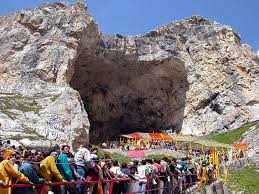
Two months after the tragic terror attack in Baisaran Valley that claimed the lives of 26 people—mostly tourists—South Kashmir's picturesque Pahalgam is once again bustling with activity. With the annual Amarnath Yatra in full swing, the region is witnessing a remarkable revival in tourism and local business.
Chief Minister Omar Abdullah, who has been at the forefront of efforts to rejuvenate the tourism sector post-attack, shared images of jam-packed roads in Pahalgam on June 22. Despite rainy weather, tourists from across the country were seen jostling for space alongside local picnickers, a heartening sight after weeks of uncertainty.
“It’s very satisfying to see the efforts my colleagues and I have been putting in slowly bearing fruit,” Abdullah remarked, expressing optimism over the valley’s gradual return to normalcy.
The revival was significantly boosted by the launch of the Vande Bharat Express train service to Kashmir by Prime Minister Narendra Modi on June 6. The train, flagged off from the Shri Mata Vaishno Devi Railway Station in Katra, now connects Jammu to Srinagar through the newly completed 272-km Udhampur-Srinagar-Baramulla rail link, improving access to tourist hubs like Pahalgam.
As part of the state’s broader strategy, Abdullah chaired back-to-back meetings to promote tourism—first in Gulmarg on May 28 and then in Pahalgam on May 27, where he held a symbolic cabinet meeting. These initiatives were intended to send a strong message of confidence to travelers and stakeholders in the hospitality sector.
After the April 22 attack, the Jammu and Kashmir government had temporarily closed 48 of the 87 designated tourist spots as a security precaution. These were reopened in phases starting June 14, leading to a visible improvement in visitor footfall. Locals credit this decision as a key turning point for business.
Local businesses, hotel owners, and transport operators in Pahalgam are reporting a significant uptick in income. “Before mid-June, our bookings were almost nil. Now, we’re running at near full capacity,” said Javaid Ahmad, a hotel manager in Pahalgam.
Markets, pony rides, shikara rentals, and roadside vendors are also witnessing increased activity, fueled not just by tourists but by the influx of Amarnath pilgrims who pass through the town on their way to the holy cave.
Following the terror attack, India carried out ‘Operation Sindoor’ on May 7, launching precision strikes on terror camps in Pakistan. The operation was followed by a four-day military escalation, after which both nations agreed to de-escalate on May 10. Security measures have since been intensified in all tourist and Yatra routes.
The successful handling of the Amarnath Yatra so far, paired with better rail connectivity and proactive governance, has brought a sense of renewed hope in Pahalgam.
As one shopkeeper put it, “Yatra ke saath, jeevan bhi wapas aaya hai” — With the Yatra, life has returned.
Two months after the tragic terror attack in Baisaran Valley that claimed the lives of 26 people—mostly tourists—South Kashmir's picturesque Pahalgam is once again bustling with activity. With the annual Amarnath Yatra in full swing, the region is witnessing a remarkable revival in tourism and local business.
Chief Minister Omar Abdullah, who has been at the forefront of efforts to rejuvenate the tourism sector post-attack, shared images of jam-packed roads in Pahalgam on June 22. Despite rainy weather, tourists from across the country were seen jostling for space alongside local picnickers, a heartening sight after weeks of uncertainty.
“It’s very satisfying to see the efforts my colleagues and I have been putting in slowly bearing fruit,” Abdullah remarked, expressing optimism over the valley’s gradual return to normalcy.
The revival was significantly boosted by the launch of the Vande Bharat Express train service to Kashmir by Prime Minister Narendra Modi on June 6. The train, flagged off from the Shri Mata Vaishno Devi Railway Station in Katra, now connects Jammu to Srinagar through the newly completed 272-km Udhampur-Srinagar-Baramulla rail link, improving access to tourist hubs like Pahalgam.
As part of the state’s broader strategy, Abdullah chaired back-to-back meetings to promote tourism—first in Gulmarg on May 28 and then in Pahalgam on May 27, where he held a symbolic cabinet meeting. These initiatives were intended to send a strong message of confidence to travelers and stakeholders in the hospitality sector.
After the April 22 attack, the Jammu and Kashmir government had temporarily closed 48 of the 87 designated tourist spots as a security precaution. These were reopened in phases starting June 14, leading to a visible improvement in visitor footfall. Locals credit this decision as a key turning point for business.
Local businesses, hotel owners, and transport operators in Pahalgam are reporting a significant uptick in income. “Before mid-June, our bookings were almost nil. Now, we’re running at near full capacity,” said Javaid Ahmad, a hotel manager in Pahalgam.
Markets, pony rides, shikara rentals, and roadside vendors are also witnessing increased activity, fueled not just by tourists but by the influx of Amarnath pilgrims who pass through the town on their way to the holy cave.
Following the terror attack, India carried out ‘Operation Sindoor’ on May 7, launching precision strikes on terror camps in Pakistan. The operation was followed by a four-day military escalation, after which both nations agreed to de-escalate on May 10. Security measures have since been intensified in all tourist and Yatra routes.
The successful handling of the Amarnath Yatra so far, paired with better rail connectivity and proactive governance, has brought a sense of renewed hope in Pahalgam.
As one shopkeeper put it, “Yatra ke saath, jeevan bhi wapas aaya hai” — With the Yatra, life has returned.
© Copyright 2023 brighterkashmir.com All Rights Reserved. Quantum Technologies